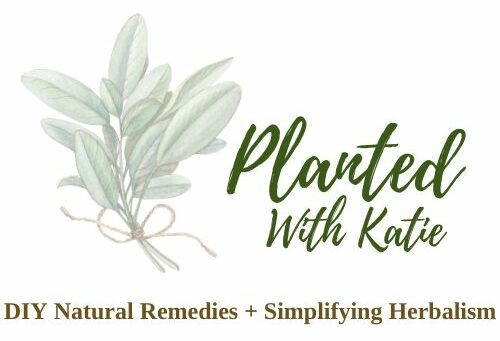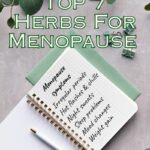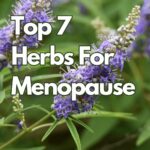Guide To Managing Menopause Symptoms With Herbs
Managing Menopause Symptoms With Herbs offers a natural and holistic approach to easing the often challenging transition faced by women. This guide illuminates the power of herbal remedies in providing relief and restoring balance during menopause.
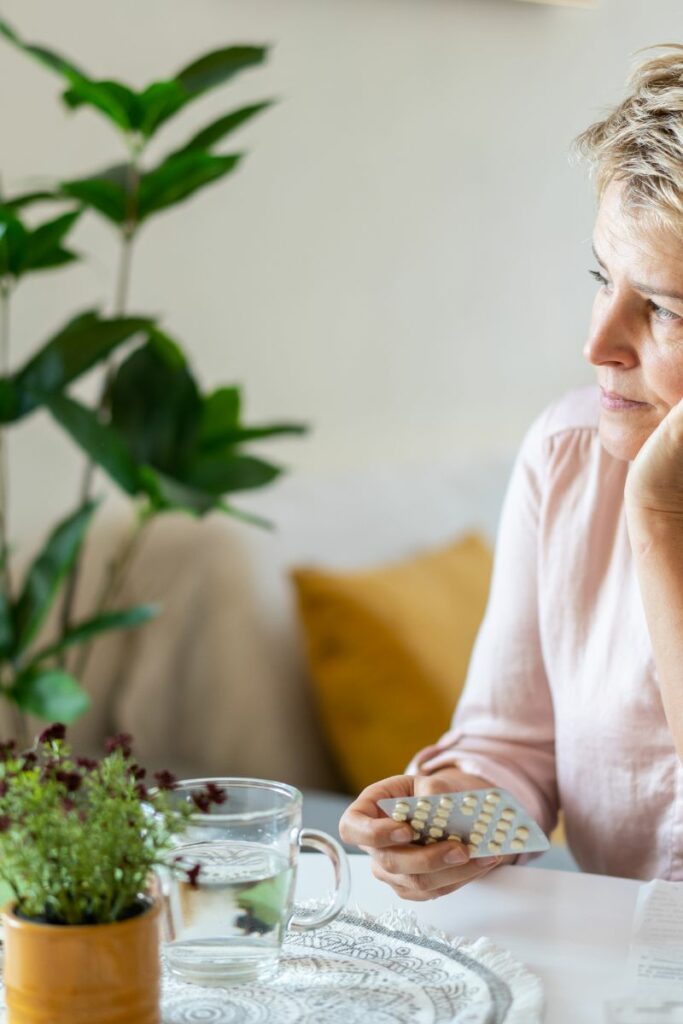
Disclaimer: This is not medical advice. Information and statements shown here are for educational and informational purposes only and are not to replace the advice of your healthcare professional.
This post may include affiliate links. Please refer to our disclaimer for full disclosure.
Menopause marks a significant transition in a woman's life, characterized by the end of menstrual cycles and accompanied by various symptoms like hot flashes, mood swings, and sleep issues. These changes stem from the body adjusting to fluctuating hormone levels, particularly estrogen and progesterone. While menopause is a natural part of aging, the discomfort it brings can significantly impact daily life.
Given the complexities of menopause, many are now exploring alternatives to hormone replacement therapy (HRT), turning their attention towards the gentle embrace of nature through herbal medicine. This shift is driven by a desire to avoid the potential side effects associated with HRT, such as increased risks of heart disease, stroke, and certain types of cancer. Moreover, personal choice plays a crucial role, as individuals seek treatments that align with a more holistic approach to health and wellness.
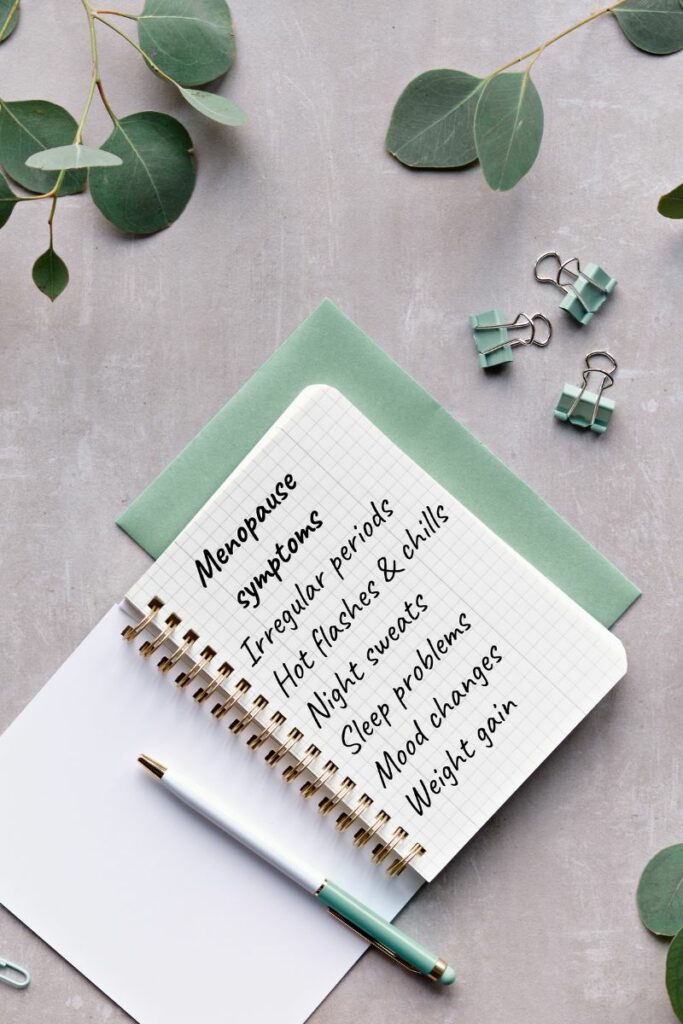
Herbs offer a compelling alternative, celebrated for their ability to naturally support the body's hormonal balance without the harsh side effects of synthetic treatments. They work in harmony with the body's innate processes, gently encouraging balance and relief from menopausal symptoms. For instance, certain herbs mimic estrogen's effects, helping to alleviate hot flashes and mood swings, while others might boost the body's production of hormones or offer support to the adrenal glands for overall well-being.
This preference for herbs over HRT isn't just about managing symptoms but embracing a more natural approach to navigating the challenges of menopause. It's about choosing a path that supports the body's health holistically, recognizing the power of plants and alternative therapies to heal and nurture.
As we go deeper into the world of natural remedies for menopause management, we can discover not only the potential for symptom relief but also the opportunity for greater harmony and balance during this transformative phase of life.
Top 5 Herbs for Managing Menopause Symptoms
1. Black Cohosh (Actaea racemosa)
Black Cohosh stands as a cornerstone herb for navigating the complex terrain of menopause, particularly revered for its impact on hot flashes, mood swings, and sleep disturbances.
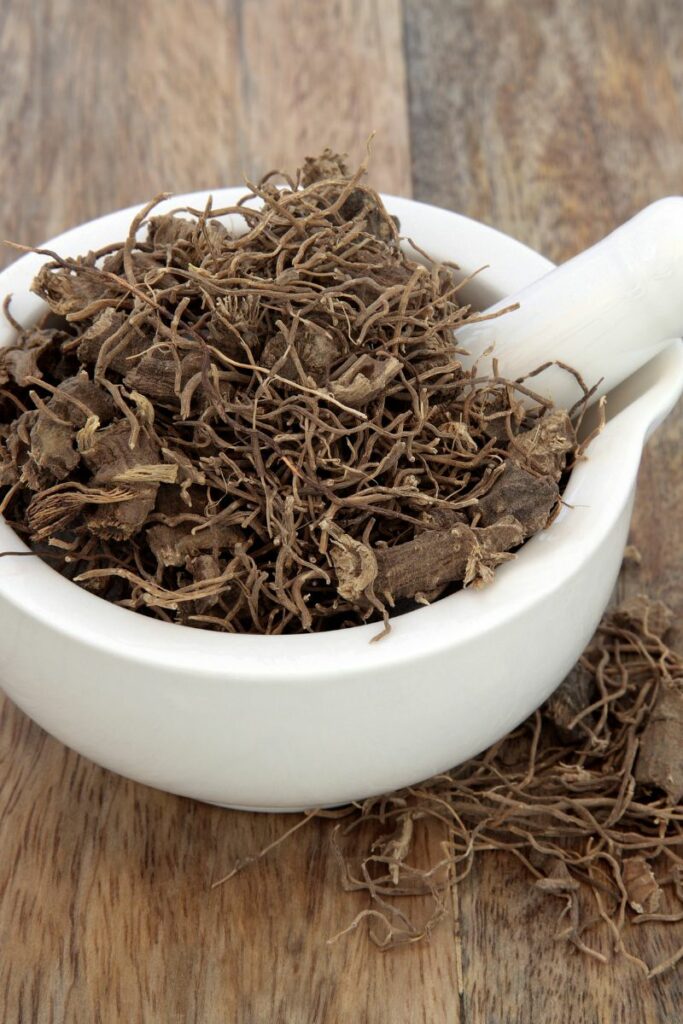
Benefits of Black Cohosh for Menopause
- Reduces Hot Flashes: Black Cohosh is highly regarded for its effectiveness in reducing the frequency and intensity of hot flashes, offering significant relief to those experiencing this common menopausal symptom.
- Alleviates Mood Swings: This herb also plays a crucial role in stabilizing mood swings, making the emotional journey through menopause more manageable.
- Improves Sleep Quality: By combating hot flashes and mood swings, Black Cohosh contributes to better sleep quality, addressing one of the major issues many face during menopause.
How to Use Black Cohosh
- As Supplements: Black Cohosh is widely available in the form of capsules or tablets, providing a convenient and measured way to include this herb in your daily routine.
- In Tea: For those who prefer a more traditional approach, Black Cohosh can be consumed as tea, offering a soothing ritual to unwind and relax.
- Liquid Extracts: Liquid extracts of Black Cohosh allow for flexible dosing and can be added to water or other beverages, tailored to individual taste preferences.
Dosage and Safety of Black Cohosh
- Follow Dosage Guidelines: It's essential to adhere to the recommended dosages provided on the product packaging or by a healthcare provider to ensure safe consumption.
- Consult Healthcare Professionals: Especially important for those with existing health conditions or those taking other medications, consulting with a healthcare provider before using Black Cohosh is advised to avoid potential interactions.
Risks or Side Effects of Black Cohosh
- Possible Liver Impact: Although rare, there have been reports of Black Cohosh impacting liver health. Monitoring for symptoms of liver distress and seeking medical advice if concerns arise is crucial.
- Mild Gastrointestinal Symptoms: Some users may experience mild side effects such as stomach discomfort or headaches when starting Black Cohosh.
2. Red Clover (Trifolium pratense)
Red clover stands out as a multifaceted herb for menopause management, targeting symptoms like hot flashes while offering broader health benefits.
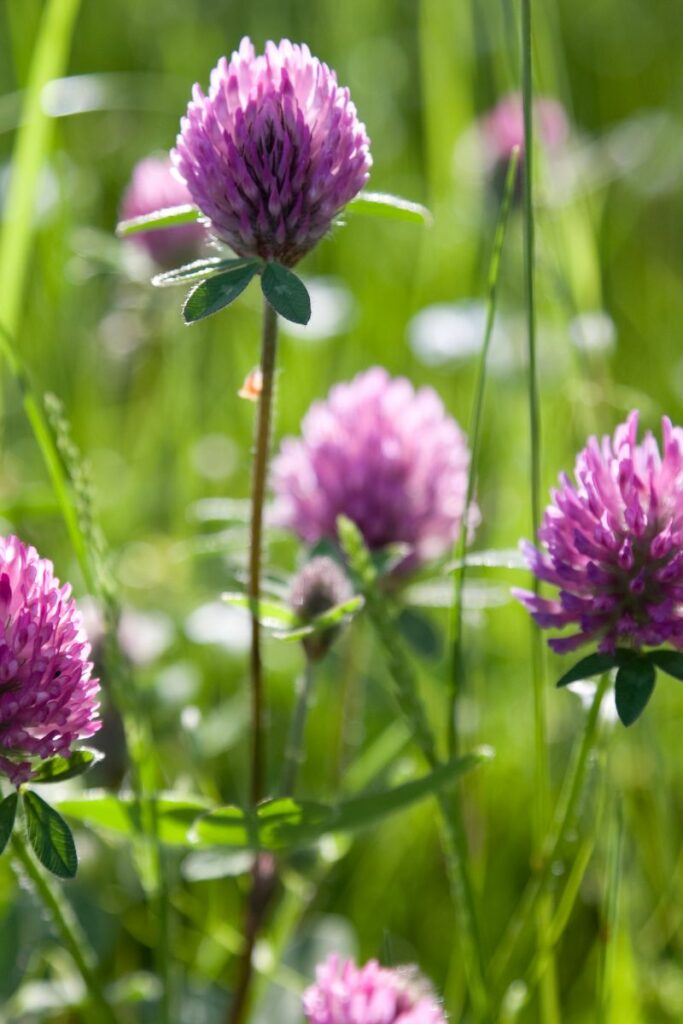
Benefits of Red Clover for Menopause
- Reduces Hot Flashes: Known for its isoflavones, red clover is effective in diminishing the frequency and severity of hot flashes, a common menopause symptom.
- Estrogenic Effect: In situations where the body's estrogen levels are low (common in menopause), Red Clover's isoflavones can provide a mild estrogenic effect, helping to reduce common menopausal symptoms such as hot flashes, night sweats, and mood swings. These isoflavones can also block the body's estrogen receptors from binding with stronger, naturally occurring estrogen.
- Improves Bone Health: The isoflavones in red clover also play a role in supporting bone density, making it a valuable ally against menopause-related bone loss.
- Supports Heart Health: Beyond menopause symptoms, red clover contributes significant improvements to the cardiovascular system by improving heart health markers such as cholesterol levels and blood pressure.
How to Use Red Clover
- As Tea: Enjoying red clover in tea form is a popular and soothing way to consume this herb, offering a moment of relaxation alongside its health benefits.
- In Supplements: For a more measured and convenient intake, red clover herbal supplements are available, providing a consistent dosage in each pill or capsule.
- As Extracts: Red clover extracts offer a concentrated form of the herb’s active ingredients, suitable for those looking for a potent option.
Dosage and Safety of Red Clover
- Follow Recommended Dosages: It’s important to adhere to the dosages recommended on supplement labels or by a healthcare provider to ensure the best results and safety.
- Monitor for Side Effects: While generally safe, some may experience side effects such as mild headaches or nausea. Starting with a lower dose can help minimize these effects.
Risks or Side Effects of Red Clover
- Consider Hormonal Sensitivities: Due to its estrogen-like effects, individuals with hormone-sensitive conditions should use red clover cautiously and consult a healthcare provider.
- Possible Interactions: Red clover can interact with certain medications, including blood thinners. Discussing its use with a healthcare provider is essential before starting.
3. Dong Quai (Angelica sinensis)
Dong Quai (known sometimes as female ginseng) stands as a cornerstone of herbal menopause management and women's health, offering a natural avenue to address the hormonal imbalances and symptoms that accompany this life stage.
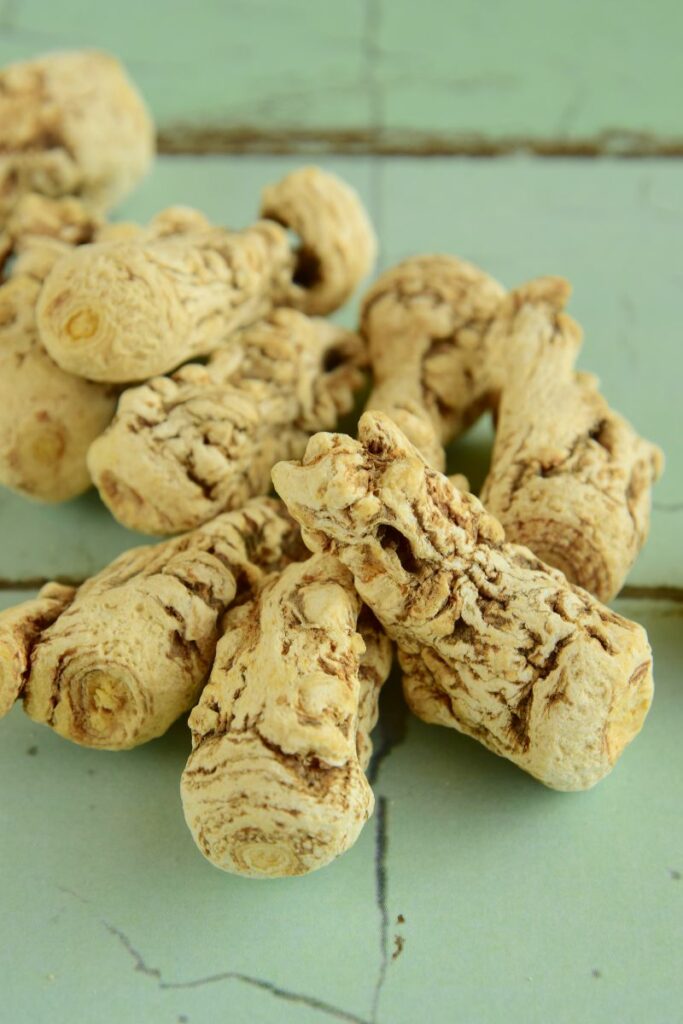
Benefits of Dong Quai for Symptoms of Menopause
- Balances Estrogen Levels: Dong Quai is often celebrated for its ability to stabilize estrogen levels in the body, making it an invaluable tool for those experiencing hormonal fluctuations during menopause.
- Eases Menstrual Cramps: Though menopause marks the end of menstrual cycles, the lead-up can involve discomfort; Dong Quai offers relief from cramping associated with this transition.
- Alleviates Menopause Symptoms: Beyond cramps, Dong Quai is used to ease common menopause symptoms, including hot flashes and mood swings, contributing to a smoother transition.
How to Use Dong Quai
- As Pills: Dong Quai pills offer a straightforward method for incorporating this herb into your menopause management strategy, providing consistent dosage in each serving.
- In Powder Form: For those who prefer a more versatile option, Dong Quai powder can be mixed into smoothies or juices, making it an easy addition to daily nutrition.
- As Tea: Brewing Dong Quai as a tea is another popular method, allowing for a soothing experience while reaping its menopausal benefits.
Dosage and Safety of Dong Quai
- Consult with Healthcare Providers: The ideal dosage of Dong Quai can vary widely among individuals; consulting with a healthcare provider can help determine the right amount for your specific needs.
- Be Aware of Blood Thinning Effects: Dong Quai is known to have blood-thinning properties, so it's important to use caution if you are on blood thinners or have bleeding disorders.
Risks or Side Effects of Dong Quai
- Possible Interaction with Other Medications: Dong Quai can interact with other medications, particularly those that affect bleeding or hormone levels. Always discuss with a healthcare provider before starting.
- Sensitivity to Sunlight: Some users may find they become more sensitive to sunlight when using Dong Quai, necessitating increased sun protection.
4. Sage (Salvia officinalis)
By utilizing sage to cool down hot flashes and night sweats, many discover a natural route through menopause's physical discomforts, making daily life more bearable.
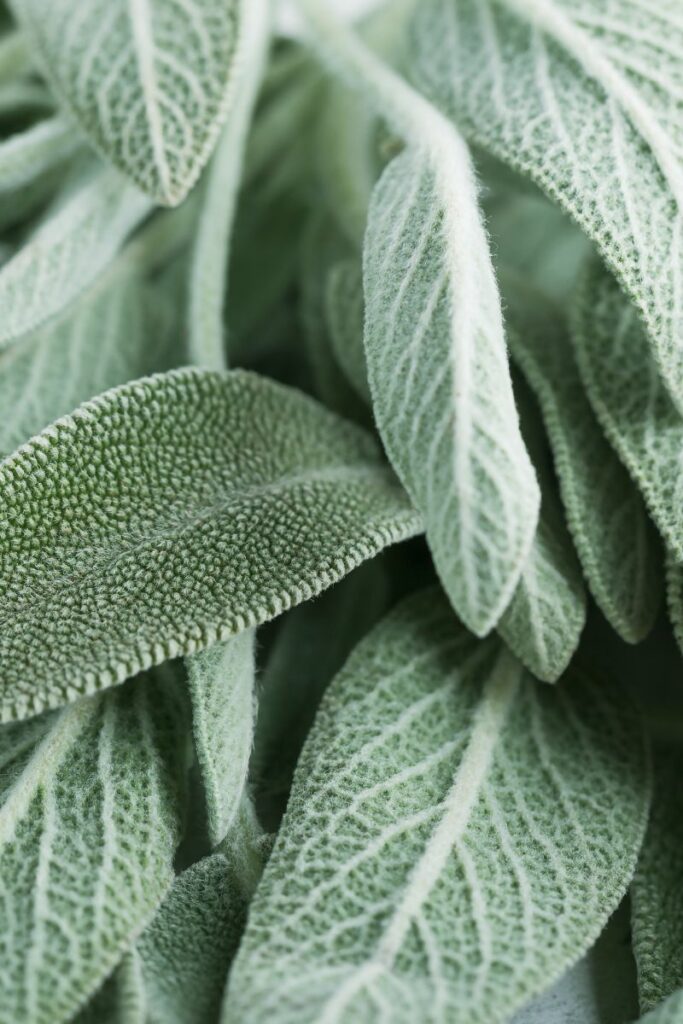
Benefits of Sage for Menopause
- Reduces Hot Flashes: Sage is known for its cooling effect, making it beneficial in lessening the intensity and frequency of hot flashes that many experience during menopause.
- Alleviates Night Sweats: Alongside hot flashes, sage can help with a significant reduction of night sweats, contributing to more comfortable and restful nights.
- Versatile Usage: Its adaptability in form—ranging from teas to culinary uses—allows for a pleasant and effective incorporation into daily routines for menopause relief.
How to Use Sage
- As Tea: Brewing sage leaves to create a soothing tea can provide a direct way to enjoy its benefits, especially for hot flashes and night sweats.
- In Culinary Dishes: Incorporating sage into your cooking not only enhances flavor but also allows you to absorb its menopausal benefits through your diet.
Dosage and Safety of Sage
- Moderation Is Key: For tea, sticking to 1-2 cups daily is recommended to avoid overconsumption.
- Culinary Consumption: Using sage in cooking is generally safe, but it's wise to be mindful of the quantity used across different dishes.
Risks or Side Effects of Sage
- Potential Overconsumption Issues: Consuming high amounts of sage, especially in supplement form, might lead to side effects like dizziness or dry mouth.
- Consider Hormonal Conditions: People with estrogen-sensitive conditions should use sage cautiously due to its phytoestrogen content.
5. St. John’s Wort (Hypericum perforatum)
By addressing mood swings and depression with St John’s Wort, many find a natural path to navigating menopause's emotional challenges.
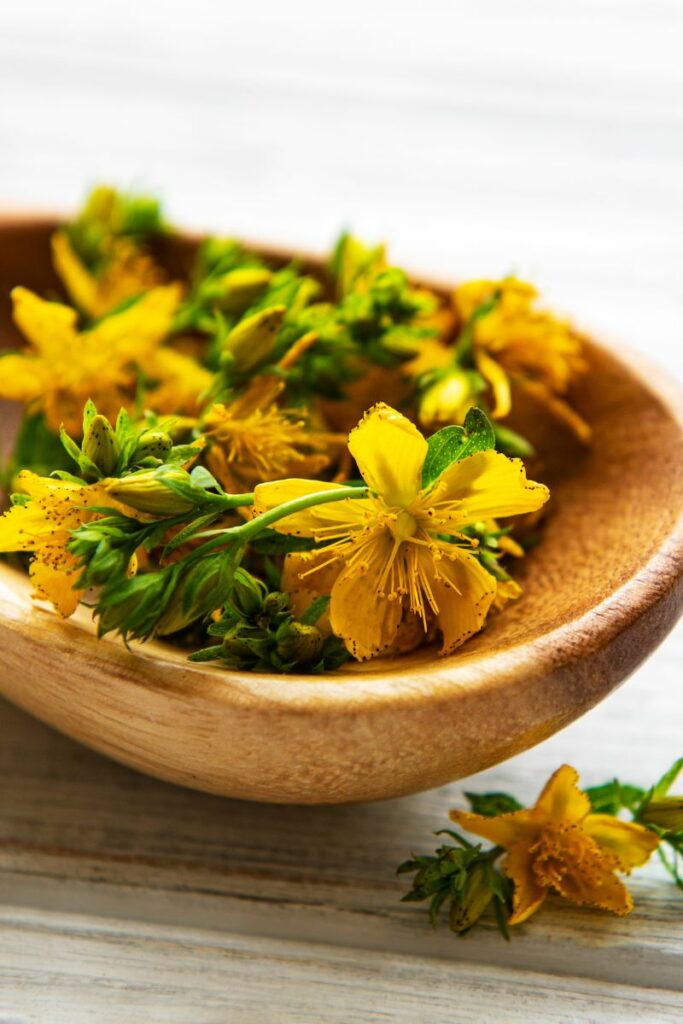
Benefits of St. John’s Wort for Menopause
- Eases Mood Swings: St. John’s Wort is highly regarded for its positive impact on mood swings, making it a key ally for those navigating the emotional rollercoasters of menopause.
- Alleviates Depression: Its use is particularly noted for diminishing symptoms of depression that can accompany menopause, offering a natural boost to mental health during this transition.
- Supports Overall Emotional Well-being: By helping to stabilize mood and alleviate depression, St. John’s Wort contributes to the overall emotional well-being of individuals going through menopause.
How to Use St. John’s Wort
- As Capsules: St. John’s Wort capsules provide a convenient way to integrate this herb into your daily health regimen, especially for mood support.
- In Tea: Brewing tea from St. John’s Wort offers a comforting, ritualistic way to consume this herb while providing mood-stabilizing benefits.
- As Tinctures: Tinctures offer a concentrated form of St. John’s Wort, allowing for easy dosage adjustment to suit individual needs.
Dosage and Safety of St. John’s Wort
- Follow Package Instructions or Healthcare Advice: It’s crucial to adhere to the recommended dosages on product packaging or those provided by a healthcare provider to ensure safety and effectiveness.
- Consultation Is Key: Given St. John’s Wort can interact with various medications, including birth control and antidepressants, consulting with a healthcare provider before starting is essential.
Risks or Side Effects of St. John’s Wort
- Potential Interactions: St. John’s Wort is known to interact with a wide array of medications, potentially altering their effectiveness.
- Sun Sensitivity: Some individuals may experience increased sensitivity to sunlight when using St. John’s Wort, making sun protection measures more necessary.
6. Wild Yam Root (Dioscorea villosa)
Wild Yam is revered in menopause management for its potential to soothe hormonal imbalances and ease symptoms like mood fluctuations, offering a natural support through topical applications or oral supplements.
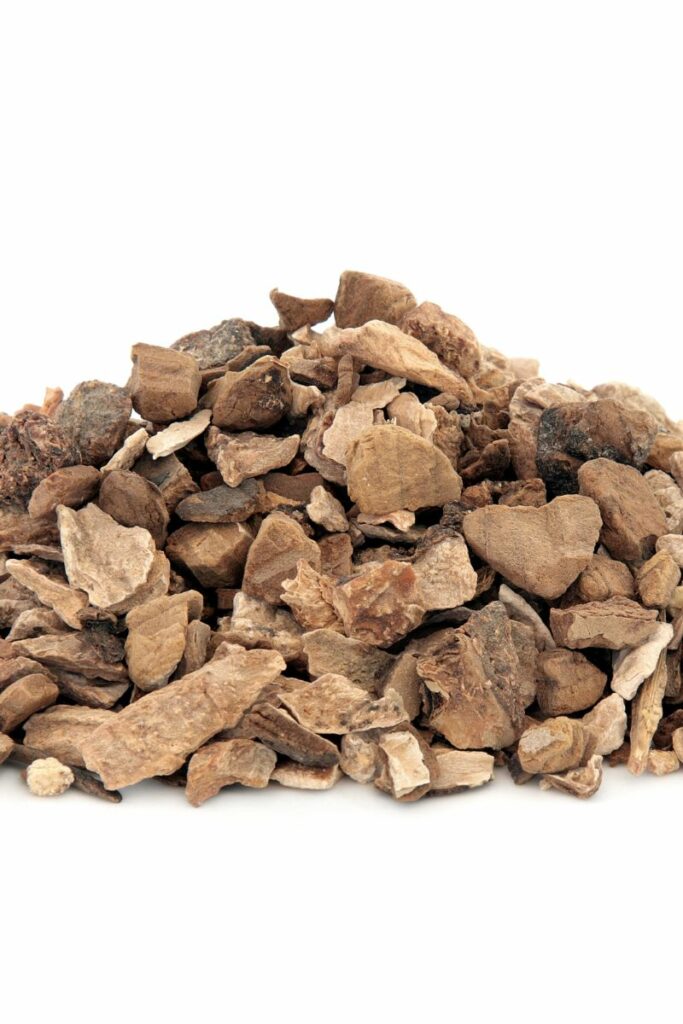
Benefits of Wild Yam for Menopause
- Eases Menopausal Symptoms: Wild Yam is celebrated for its soothing effect on various menopause symptoms, including hormonal imbalances and mood fluctuations.
- Supports Hormonal Balance: It contains diosgenin, a compound thought to help balance hormones, potentially easing the transition through menopause.
- Promotes Digestive Health: Besides its menopausal benefits, Wild Yam supports overall digestive health, which can be beneficial during menopause when some experience changes in digestion.
How to Use Wild Yam
- As Creams: Wild Yam can be applied topically as a cream, allowing for direct absorption through the skin, often focused on areas affected by menopause symptoms.
- In Supplements: For those who prefer an oral approach, Wild Yam is also available in capsules or tablets, providing a systemic effect on menopause symptoms.
Dosage and Safety of Wild Yam
- Follow Product Instructions: Whether using cream or supplements, it's important to adhere to the recommended dosages on the product label.
- Consult with a Healthcare Provider: Before incorporating Wild Yam into your routine, discussing it with a healthcare provider is crucial to ensure it's appropriate for your health profile.
Risks or Side Effects of Wild Yam
- Potential Skin Irritation: When using Wild Yam cream, some may experience skin irritation at the application site.
- Considerations for Oral Use: Oral supplements should be used under the guidance of a healthcare provider to avoid any adverse effects.
7. Chaste Tree Berry (Vitex agnus-castus)
Chaste Tree Berry aids in regulating hormonal levels during menopause, providing relief from mood swings and contributing to overall hormonal balance.
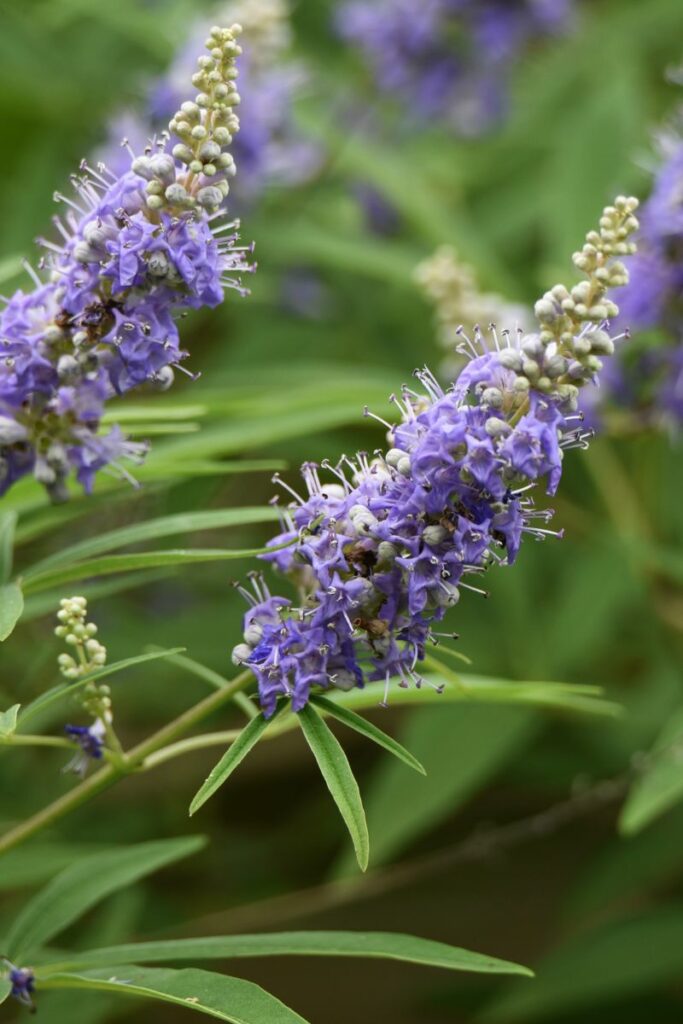
Benefits of Chaste Tree Berry for Menopause
- Regulates Hormonal Activity: Chaste Tree Berry is known for its ability to regulate hormonal levels, offering relief from symptoms like mood swings and irregular cycles during perimenopause.
- Supports Overall Menopausal Health: Its holistic effect on the body makes it beneficial for addressing a variety of menopausal symptoms, including promoting a more balanced emotional state.
How to Use Chaste Tree Berry
- As Supplements: The most common form is in capsules or tablets, making it easy to incorporate into daily health routines for hormonal support.
- Liquid Extracts: For those who prefer a liquid form, Chaste Tree Berry extracts can be diluted in water or another beverage and consumed for menopausal support.
Dosage and Safety of Chaste Tree Berry
- Adhere to Recommended Dosages: Always follow the dosage guidelines provided by the product or a healthcare provider to ensure effectiveness and minimize risks.
- Healthcare Consultation: Consulting with a healthcare provider before starting Chaste Tree Berry is important, especially for those with hormone-sensitive conditions or taking hormone-related medications.
Risks or Side Effects of Chaste Tree Berry
- Mild Digestive Upset: Some individuals may experience mild digestive upset when beginning Chaste Tree Berry supplements.
- Hormonal Sensitivity: Due to its impact on hormone levels, users should be cautious and consult with healthcare providers, particularly if there are pre-existing hormone-sensitive health issues.
Frequently Asked Questions When Managing Menopause Symptoms With Herbs
How quickly can one expect to see improvements with herbal treatments?
Improvements can vary; some see changes in a few weeks, others may take months. It depends on the herb, symptom severity, and your body. Regular use is important.
Can I use multiple herbal remedies at the same time for menopause?
While it's possible to use multiple herbs, it's crucial to understand how they interact with each other and with any existing medications.
Are some herbs better applied topically than taken orally for menopause?
Yes, for example, sage can be used in a cooling spray for hot flashes and wild yam is said to be best absorbed topically. However, most benefits for menopause, like mood regulation or hot flash relief, come from taking herbs orally. Always check the best use for each herb.
Are herbal remedies for menopause safe for everyone?
Herbal remedies offer a natural alternative for managing menopause symptoms, but they may not be suitable for everyone, especially individuals with specific health conditions or those taking certain medications. It's essential to consult with a healthcare provider before starting any herbal treatment.
Can herbal remedies replace hormone replacement therapy (HRT)?
While herbal remedies can provide relief for menopause symptoms for some, they may not be a direct replacement for HRT in all cases. The effectiveness can vary based on individual health profiles and the severity of symptoms.
How do I choose the right herbal remedy for my menopause symptoms?
Selecting the right herbal remedy depends on your specific symptoms, overall health, and any other medications you might be taking. Research, combined with professional advice from a healthcare provider, can help identify the most suitable option.
Will lifestyle changes enhance the effectiveness of herbal remedies for menopause?
Yes, incorporating lifestyle changes such as a balanced diet, regular exercise, and stress management techniques can enhance the effectiveness of herbal remedies and contribute to overall well-being during menopause.
Are there any dietary considerations when using herbal remedies for menopause?
Certain herbs may interact with foods or have dietary restrictions. For instance, some herbs may require avoiding or limiting alcohol and caffeine.
For herbs requiring limiting or avoiding alcohol and caffeine:
Black Cohosh: With use of black cohosh, It's advised to limit alcohol consumption as both can stress liver function.
St. John’s Wort: Alcohol may reduce its effectiveness and exacerbate side effects; caffeine can also interact, potentially leading to increased anxiety or tension.
Dong Quai: Alcohol may increase the risk of bleeding associated with Dong Quai, while caffeine might counteract its relaxing effects on the vascular system.
Is it necessary to take breaks from using herbal remedies, or can they be used continuously?
Depending on the herb, continuous use may be fine, but some may require taking breaks to prevent potential side effects or decrease in effectiveness.
Here are a few specific examples:
Black Cohosh: Commonly advised to be used for up to six months continuously, followed by a break. This cycle helps mitigate any potential liver strain and maintains its efficacy in relieving menopause symptoms.
Dong Quai: While not universally required, some practitioners suggest taking a break after using Dong Quai for three to six months. This is partly to prevent any long-term hormonal imbalance and to reassess the body's needs.
St. John’s Wort: Known for its impact on mood and depression, cycling its use—with periods of use followed by breaks—is often recommended, particularly due to its interactions with other medications and potential photosensitivity issues.
Red Clover: Suggested to be used for a maximum of 3 to 6 months before taking a break. This precaution is mainly due to its phytoestrogen content and the theoretical risk of affecting hormone-sensitive tissues.
Chaste Tree Berry: Often recommended to cycle its use, especially after extended periods (5 to 6 months) to prevent overstimulation of the hormonal system and maintain its benefit in regulating menstrual cycles and menopause symptoms.
For further study on herbs for menopause management, I suggest reading this article the article "A review of effective herbal medicines in controlling menopausal symptoms". It gives scientific evidence about how different herbs can help with menopause symptoms like hot flushes and mood swings. It looks at studies from 1994 to 2016 on herbs like Sage and Black cohosh, showing they can be good alternatives to hormone therapy.
